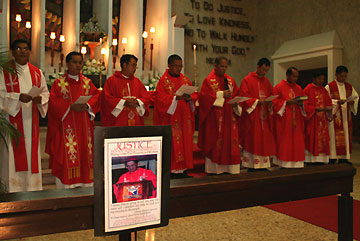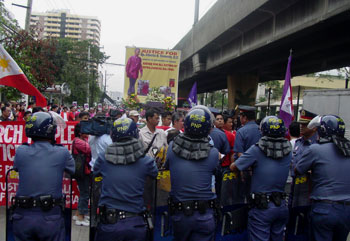Bishop Alberto Ramento:
True Bishop of the Poor
Many paid tribute to
Bishop Alberto Ramento. But the most touching tribute came from workers
he supported during their struggles.
As his son,
Alberto Ramento III, said, “Hanggang sa huli, pag-aari pa rin siya ng
simbahan. Hanggang sa huli, siya ay para pa rin sa masa.”
(Until the end, he is
owned by the church. Until the end, he will be with the masses.)
BY EMILY VITAL
Bulatlat

REQUIEM MASS: IFI priests offer prayers
in a funeral mass for slain Aglipayan Bishop Alberto Ramento at their
church’s national cathedral in Manila, Oct. 12
PHOTO BY
AUBREY MAKILAN |
Many people came to honor Bishop Alberto
B. Ramento. The most touching tribute to him came from workers he
supported during their struggles. His eldest son and the youth of Iglesia
Filipina Independiente (IFI) also gave testimonies extolling Bishop
Ramento’s selflessness in serving the poor.
Marlene Gonzales, a member of the
Nagkakaisang Manggagawa ng Chong Won Fashion (NMCW or United Workers of
Chong Won Fashion), read a statement from the Solidarity of Cavite
Workers. The statement referred to Bishop Ramento as an organizer of
Cavite workers. Before the end of her speech, Marlene’s voice quivered.
|
In an interview, Marlene said they miss
Bishop Ramento’s presence especially at this time when the workers have
more struggles to go through.
Marlene first met Bishop Ramento in 1999
during a strike by Ishida workers. “Pumupunta siya roon at nagmimisa sa
harap ng piketlayn.” (He visited the workers and celebrated mass in
front of the picket line.)
The good bishop also used to join them in
negotiating with the capitalists. “Hinaharap niya ang mga taga-PEZA
para ipagtanggol kami.” (He faced the officials of the PEZA or
Philippine Economic Zone Authority to defend us.)
Bambi Valenciano, staff member of the
Workers Assistance Center (WAC) in Cavite, said Bishop Ramento was a very
approachable bishop. “Simpleng tao. Sa unang tingin, hindi mo iisipin
na bishop siya. Laging nakangiti. Komedyante.” (He was very simple. At
first, you wouldn’t think he’s a bishop. He was always smiling and was a
comedian.)
Bishop Ramento always found time to visit
the workers in the economic zones “Inaalam niya ang sitwasyon nila.”
(He always asked about the situation of workers.), Bambi said.
Marlene recalled vividly Bishop Ramento’s
message to them during the 10th anniversary of WAC. Bishop
Ramento said, “Tuloy-tuloy na ipagtanggol ang isinusulong na dagdag na
sahod. Hindi ito ibibigay nang kusa. Lalong magpalakas para labanan ang
kontra-manggagawang mga patakaran.” (Let us persist in the struggle
for wage increases. It will not be given to you freely. Strengthen your
ranks to fight against anti-worker laws and policies.)

Police stop IFI clergy and lay
faithful, and their supporters, during their Oct. 12 symbolic funeral
march for slain Bp. Alberto Ramento
PHOTO BY
AUBREY MAKILAN |
In Tarlac, as in Cavite, the s and farm
workers at the Hacienda Luisita found a staunch ally in Bishop Ramento.
Rene Galang, president of the United
Luisita Workers Union (ULWU), said, “Naantig ang mga manggagawang bukid
sa kanyang suporta.” (The farm workers were touched by his support.)
Rene, Ka Boyet to his fellow workers, said Bishop Ramento was there when
the workers were about to lose hope.
Ka Boyet said that after the November 16
massacre in 2004, Bishop Ramento did not falter in his support even in the
presence of soldiers. “Ipinagpatuloy niya ang pagtataguyod ng
katarungan para sa amin.” (He continued defending our rights.)
|
Ka Boyet also said that Bishop Ramento
also helped them to survive through their most difficult times.
“Ngayon, mayroon na kaming1,000 ektarya ng palay at gulay. Malaki ang
naging ambag ni Bishop Ramento para rito.” (Now we have 1,000
hectares of land for rice and vegetables. Bishop Ramento contributed a
lot in our struggle to acquire this land.)
Sol Capati, a member of the Youth of the
IFI, remembered when she asked the good bishop about the death of IFI
priest Fr. William Tadena.
“Sinabi niya na pinatay si Fr.
Tadena para hindi na makapagsalita at hindi na makapagbigay ng pagkain at
inumin sa masa.” (
Bp. Ramento told me that Fr. Tadena was killed to silence him and to
prevent him from giving food and water to the masses.)
Sol said, “Tinanong ko siya kung
natatakot siya para sa sarili niyang buhay. Ang sabi niya sa akin – Baon
na ang isa kong paa sa hukay. Hindi ko na kailangang matakot. Isusugal ko
ang buhay ko para sa sinumpaan kong paglilingkod sa Diyos at sa bayan.”
(I asked Bp. Ramento if he was not afraid for his life. He said he
already had one foot in the grave. He did not have to be afraid anymore.
He would just gamble with his life in order to pursue his vow to serve God
and the people.)
Sol said that Bishop Ramento’s life was
indeed Pro Deo et Patria (For God and for Country). She said that
the good bishop is a father to many IFI youth and priests.
“Nagmulat siya sa marami sa amin
hinggil sa isyung panlipunan.”
(He awakened a lot of
us, the youth, about social issues.)
His eldest son, Alberto Ramento II, also
known as Aldos, talked of his father’s love for the poor.
Aldos said that most of his father’s
stories were about the plight of the poor workers and
s. He said they, his family, lived a
frugal life. “Itinuro niya sa amin paano mabuhay tulad ng masa.”
(He taught us how to live like the masses.)
Aldos related, “Kapag nagsasaing sa
bahay, kailangan sakto lang. Sasabihin niya maraming nagugutom.
Paulit-ulit niyang
sinasabi na ang sobra, kailangang ibibigay natin sa nangangailangan.”
(When they were
cooking rice at home, Bp. Ramento insisted that they cooked only what
could be consumed. He told them repeatedly that whatever surplus they had
should be given to those in need.)
Aldos, who served as his father’s
sacristan, recalled that his father would always take him to places where
the poor live. “Sa
halip na resort sa Cavite, dadalhin niya ako noon sa komunidad ng
mahihirap na mangingisda.”
(Instead of bringing me to
resorts in Cavite, he brought me to poor fisherfolk communities.)
Aldos said his father told him stories
about the workers of the Saulog Transit who went on strike. Bishop Ramento
met with the union members in the Church. When he went to college, Aldos
said he met workers of Saulog transit who told him how his father helped
them then.
Aldos said he had “the coolest Dad on
earth.” Aldos said the bishop liked Bob Marley. “Get up! Stand up!
and Exodus are his favorites.”
The eldest son revealed they knew of the
death threats. “Pamutat na lang naming sa hapunan.” (They served as
dessert for our dinner.) He said most of them were text messages.
Aldos said his father wanted that his
remains be brought to the IFI
Church in San Antonio in Cavite. “Gusto
niya lagi, iyong pinakasimple.” (He always preferred the simplest.)
Aldos said his father’s urn will be turned
over to the church. “Hanggang sa huli, pag-aari pa rin siya ng simbahan.
Hanggang sa huli, siya ay para pa rin sa masa.” (Until the end, he is
owned by the church. Until the end, he will be with the masses.)
Bulatlat
BACK TO
TOP ■
PRINTER-FRIENDLY VERSION ■
COMMENT
© 2006 Bulatlat
■
Alipato Media Center
Permission is granted to reprint or redistribute this article, provided
its author/s and Bulatlat are properly credited and notified.